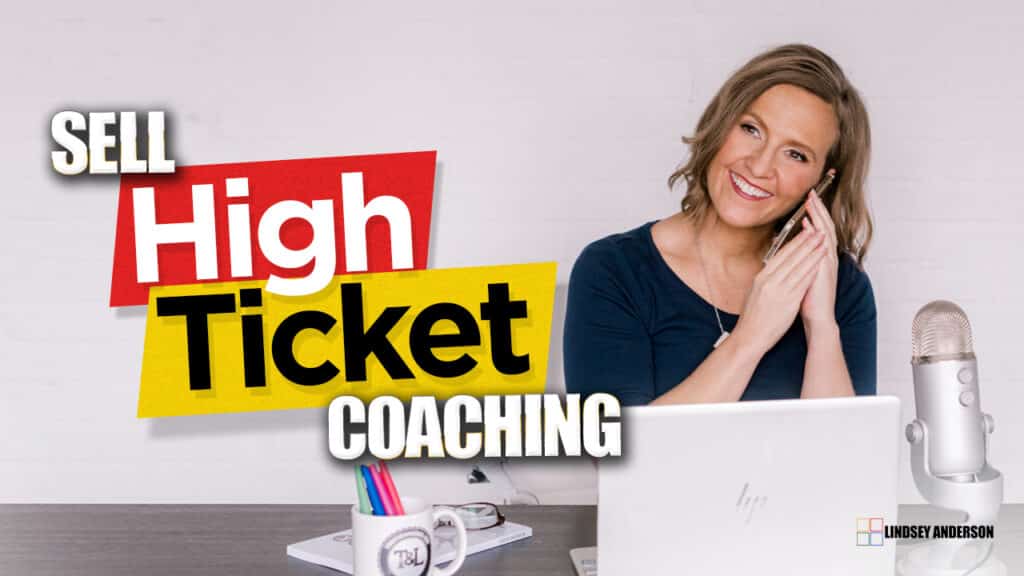
Want to know how to sell high ticket coaching so that you’re adding better, higher-paying clients to your programs? Well, today, I’m going to show you how.
I recently got to walk through one of the most impressive high-ticket coaching presentations I’ve ever experienced. It was following a five-day course with Scott Oldford, someone I really look up to and respect.
I’m itching to share more about that experience, as well as my own five-part strategy on how to sell high ticket coaching!
But first …
What Are High Ticket Coaching Sales?
You see the term high ticket sales everywhere, but what is the value of a high ticket sale, exactly?
In the coaching world, we’re talking sales upwards of $2,000.
I already know what you’re thinking. Lindsey, that’s a pretty decent chunk of money. Is it realistic to generate these types of coaching sales consistently?
Yes.
Not only is it realistic, but it’s also pretty important that you know how to sell high-ticket coaching.
Why Are High Ticket Coaching Sales Important?
High ticket sales are vital for the health of your coaching business—not only because of the higher dollar amount, but also because these sales tend to result in better clients, and I’ll explain why.
First, let’s look at the type of client you typically don’t want flooding your coaching programs—the person you have to pressure into buying your services. The person who doesn’t really want to be there. The person who’s going to be unhappy and dissatisfied, regardless of what you do.
You don’t typically want to go after these sales, because let’s face it—coaching these people can be draining. High-pressured clients often make your job harder. And honestly, chasing them around will make you miserable.
Now, contrast this with the person who is willing to invest their time, money, and energy into your coaching program. The person you don’t have to nag to work with you. The person who is eager to learn, lap up everything you’re offering and hang on to your every word.
These are the types of clients you want for your coaching business. Now, let me show you exactly how to sell high-ticket coaching!
How to Sell High Ticket Coaching in 5 Simple Steps

For many people, high ticket sales can be pretty intimidating. Well, it doesn’t have to be. You can start selling high ticket coaching today by following this proven five-step strategy:
1. Craft a GREAT Lead Magnet
Everyone who knows anything about how to sell high ticket coaching will tell you that you first need a lead magnet. But here’s the thing—it has to be one that actually works.
Without a lead magnet that offers real value, you’re going to struggle to keep any of your coaching candidates engaged and interested in working with you.
What’s a lead magnet? It’s that little carrot you dangle in front of your clients. It could be a book, a program—anything that offers value and shows potential clients that you’re the real deal.
In my recent experience, Scott’s lead magnet was his five-day course. And let me tell you—he delivered. There was so much value in that course that I was still engaged until the very end and when the time came for Scott to make his pitch.
And that’s exactly what you’ve got to do with your lead magnet. If you want the opportunity to make a pitch to your coaching candidates, make sure you deliver upfront!
2. Don’t Act Desperate
One of the biggest mistakes coaches make is when they forfeit a position of power and come off as desperate.
Look, I get it—you might need to land a certain number of clients in order to keep your schedule full and pay your bills. We’ve all been in that boat at one point or another!
And do you know why it’s hard not to be pushy at times? Because being pushy can work. The truth is that “fire sale” and “in your face” techniques can help you close sales—especially low ticket sales.
But I’m telling you right now, acting desperate rarely lands you happy coaching clients. Sure, you might feel relieved after closing a few sales. But long-term? It’s bad for your coaching business.
Instead, remember this—you’re the expert in the room! And that means the right people will come to you if they see the value in what you can offer. Resist the urge to constantly harp on your next offer or force-feed your pitch down someone’s throat.
During Scott’s five-day course, he rarely brought up the subject of working with him. He was far more focused on delivering value to those who signed up for his course.
It was really only towards the end of the course that he put the option out there. And even then, he was very nonchalant about it—never begging, pleading, or pushing people into taking action.
The lesson here? Focus on establishing yourself as the expert and delivering value with your lead magnet. This will make pitching your next offer and attracting the right clients a whole lot easier!
3. Vet Your Coaching Candidates
The next thing you need to know about high ticket sales is that it’s OK to vet your coaching candidates. In fact, you should be vetting them! This will help you separate the good clients from, well, the not-so-good clients.
And there are all sorts of ways to achieve this. At the end of Scott’s course, he simply passed along a questionnaire for those who wanted to work with him.
Did you catch that? Just by passing along an optional questionnaire, he was vetting his candidates right from the jump. Those who wanted to work with him took the questionnaire. Those who didn’t want to—guess what? They didn’t!
The questionnaire contained a handful of questions. One of the most notable ones was something along the lines of “How much money do you make?”
And this question was accompanied by a little note that was something to the effect of “My programs run at a fixed rate, so that’s not the reason I’m asking that question. I’m asking that question to see if we’re a good fit.”
There was a purpose for every question, and each one filtered out candidates who weren’t one of Scott’s ideal clients.
So, don’t be afraid to vet your coaching candidates. Weeding out people who aren’t your ideal candidates will leave you with a group of high-quality, high ticket sales!
4. Treat Your High Ticket Coaching Candidates Like Gold
After vetting your candidates, you should be left with a group of people who are excited to work with you. And that’s awesome!
But the work isn’t quite done yet …
After I submitted Scott’s questionnaire, I was contacted via text. But get this—it wasn’t a bot or an automated message. It was Scott’s assistant, and we had a really organic back-and-forth in real-time.
Again, there was never anything that came off as pushy or desperate. It was just a normal, genuine conversation—one that made me feel supported and heard.
That type of personal touch? That’s what you’re going to need in order to close your high ticket sales.
We’ve all “signed up for texts” before only to be hounded by automated messages. They always come off as generic, insincere, and annoying. And guess what? They just aren’t very effective.
I talk about this in my coaching content formula workshop—the idea that you need to stop viewing people as numbers without feelings or emotions.
People are smarter than that. They can sense when you’re being desperate. They can sense when you’re being pushy. They can sense when you’re not being genuine.
So, the point is this: how you view a coaching candidate affects how they will respond.
If you view a potential client as nothing more than a high ticket sale you need to meet your monthly goal, you’re going to scare that person away. But if you view that client as a person you have vetted and someone you can help, you’re on the right track.
5. Give Candidates Space to Make Their Own Decision
When high ticket coaching sales are within reach, it can be tempting to ramp up the sales pressure.
But it’s critical that you let your candidates decide for themselves. Believe it or not, this actually keeps you in the position of power because you never come off as needing that client.
During my conversation with Scott’s assistant, we eventually got talking about my problems—to which she recommended Scott’s upper-level program. But check this out—she never actually told me about the cost until I asked.
She sent over a friendly Google document, tailored for me, with an overview of the program and what it entailed. No high-pressure sales. No testimonials. Just the information about the program!
The conversation ended without me feeling annoyed or pressured into buying. Instead, I left feeling valued and that I’d been given the space to make my own decision.
And in the context of this five-step strategy, this low-pressure approach to closing a high ticket sale is wildly effective.
You don’t have to worry about staying top-of-mind or making a powerful impression. Why? Because you’ve already made that personal touch with your coaching candidate. This not only sets you apart from other coaches but also gives your candidate an easy way to connect again.
Get Out There and Start Selling High Ticket Coaching!
Now that you know how to sell online coaching, there’s no reason why you can’t start bringing in higher-paying clients. Just be sure to stick to my five-step high ticket coaching process!
When it comes to high ticket coaching, what are the biggest challenges you have faced? I’d love for you to share your experience with me down in the comments!

